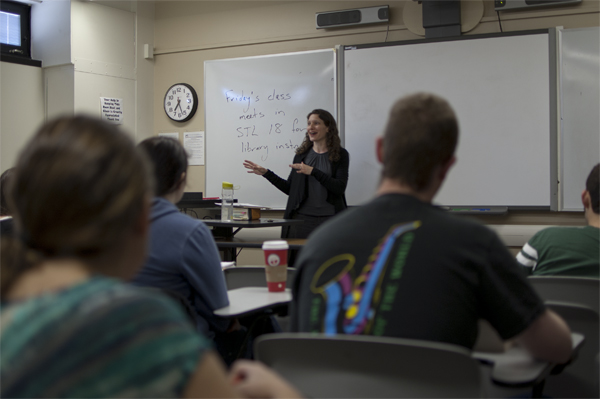

Both college administrators and union officials are gathering opinions and data to assess changes in the faculty workload at SUNY New Paltz.
While an administrative study is still underway, the United University Professions (UUP) union will be hosting a forum next week to discuss workload-related issues that faculty face.
Jeff Miller, UUP vice president of academics, said on Tuesday, April 3 at 3:30 p.m. at College Terrace, “Workload, Faculty Voice and Quality in Higher Education” will feature former American Association of University Professors General Secretary Gary Rhoades.
Miller said this scholar, who has conducted research focused on the restructuring of academic institutions and professions in the academy, science and technology policy, and comparative higher education, can hopefully illuminate issues that will spark discussion when those in attendance break into small groups.
“What we are hoping to do is make faculty members at New Paltz aware of some of the problems associated with [workload] — I am sure a lot of them are — but also making them aware of the fact that this is a problem that transcends SUNY New Paltz,” he said. “What we are starting to do at UUP is develop the kind of metrics that we could use to evaluate changes in workload across the campus over the next couple of years.”
The union began doing work “parallel” to the study administrators started last year, Miller said. However, President Donald Christian said the research is still in its early stages.
Christian said data on faculty workload — which encompasses the number of courses a professor teaches, the number of students and advisees they are responsible for, their personal research, their service on committees and more — has been very difficult to get together in a concrete way.
“I used the metaphor quite often that measuring faculty workload and contributions is not like measuring performance in a 100-meter dash, where you have a single metric, which is how fast you run the race,” he said. “Faculty workload and contributions are very complex and there’s no simple way to measure them and we get into all kinds of comparisons. All of those dynamics are what we’re trying to get a handle on.”
The administrative group working on the faculty workload study has a survey that they are ready to send out to faculty to see their perceptions of their workloads.
Chief of Staff Shelly Wright said the survey should be sent out shortly. It includes questions about what faculty teach, the circumstances in which the faculty have releases from teaching courses for various administrative or leadership roles, how they spend time out of the classroom and more, Christian said.
Christian said leadership transitions the college is facing, including the hiring of a new president and the continued searches for a new provost and two deans, have affected progress on the study. The president said that since officials hope to wrap up these searches by the end of this year, they can continue work on this study in 2013.
Wright said it is important for the campus to remember that the differing pressures faculty are facing from increased workload cannot be corrected instantly.
“One size does not fit all,” she said.
UUP leadership requested to have a representative sit on the administration’s task force, but their request was denied.
Union officials also sent out their own faculty survey online about three weeks ago. Miller said while he does not know what stage the administrative study is at, UUP members are trying to get some ideas about where faculty spend their time and on what.
“For example, I am in the political science department and I know what we do but I don’t necessarily know what biologists do,” he said. “All of these things seem sort of mysterious, so we are trying to collect information that we can use to make kind of an informed judgment about the way things are going in the next couple of years.”
Miller said UUP members also continue to meet individually with faculty who have personal matters they’d like to discuss. Since last year’s multi-million dollar budgetary deficit forced officials to cut the part time personnel budget and other services, Miller said union members have seen a dramatic increase in the concerns of faculty.
Financial constraints putting more pressure on professors who kept their job is a national issue, Miller said.
“These cuts have had real, serious consequences: increased class sizes, not being able to hire faculty members to replace retiring faculty or others,” he said. “To make amends for these budgetary shortfalls, many colleges have increased faculty workload in a number of different ways.”
Christian said in his discussion with colleagues at different colleges across the country, “everyone seems to be wrestling with uncertainty,” when it came to dealing with this issue.
“Partly we have to ask for people’s patience and goodwill because it takes time,” Christian said.
